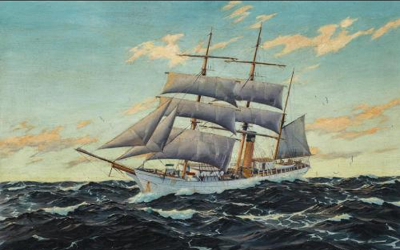On October 12, 1492 (the first day he encountered the native people of the Americas), Columbus wrote in his journal: “They should be good servants …. I, our Lord being pleased, will take hence, at the time of my departure, six natives for your Highnesses.” These captives were later paraded through the streets of Barcelona and Seville when Columbus returned to Spain.
From his very first contact with native people, Columbus had their domination in mind. For example, on October 14, 1492, Columbus wrote in his journal, “with fifty men they can all be subjugated and made to do what is required of them.” These were not mere words: after his second voyage, Columbus sent back a consignment of natives to be sold as slaves.
Yet in an April, 1493, letter to Luis de Santangel (a patron who helped fund the first voyage), Columbus made clear that the people he encountered had done nothing to deserve ill treatment. According to Columbus:
“they are artless and generous with what they have, to such a degree as no one would believe but him who had seen it. Of anything they have, if it be asked for, they never say no, but do rather invite the person to accept it, and show as much lovingness as though they would give their hearts.”
Nonetheless, later in the letter Columbus went on to say:
“their Highnesses may see that I shall give them as much gold as they need …. and slaves as many as they shall order to be shipped.”
Following Columbus’ discovery, Pope Alexander VI issued a May 4, 1493, papal bull granting official ownership of the New World to Ferdinand and Isabella. To these monarchs, the Pope declared:
“We of our own motion, and not at your solicitation, do give, concede, and assign for ever to you and your successors, all the islands, and main lands, discovered; and which may hereafter, be discovered, towards the west and south; whether they be situated towards India, or towards any other part whatsoever, and give you absolute power in them.”
This decree did not go unchallenged. Francis I of France, for example, later quipped: “The sun shines on me as well as on others. I should be very happy to see the clause in Adam’s will which excluded me from my share when the world was being divided.”
Nonetheless, the Pope’s declaration ultimately had dire consequences for native inhabitants of the Americas. Beginning in 1514 Spanish conquerors adopted “the Requirement,” an ultimatum in which Indians were forced to accept “the Church as the Ruler and Superior of the whole world” or face persecution. If Indians did not immediately comply, the Requirement warned them:
“We shall take you and your wives and your children, and shall make slaves of them, and as such shall sell and dispose of them as their Highnesses may command; and we shall take away your goods, and shall do all the harm and damage that we can.”
Often the Requirement was read to Indians without translation, or in some cases even from ships before crew members landed to kill Indians and take slaves.
文波陪伴,英语不难
文波陪伴,PTE不难
文波PTE,墨尔本悉尼霍巴特阿德莱德PTE最好的PTE培训学校





